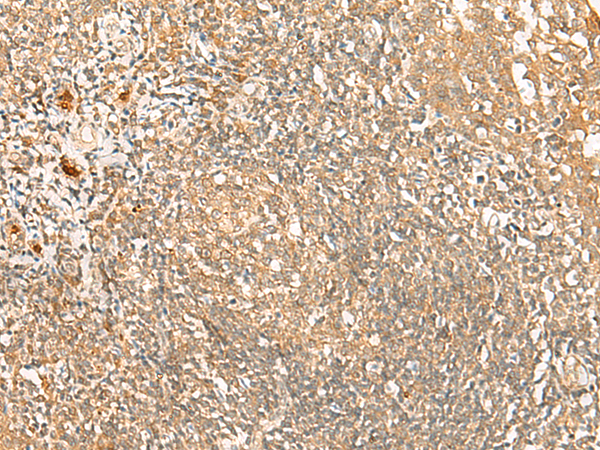
| WB | 咨询技术 | Human,Mouse,Rat |
| IF | 咨询技术 | Human,Mouse,Rat |
| IHC | 1/ 40-200 | Human,Mouse,Rat |
| ICC | 技术咨询 | Human,Mouse,Rat |
| FCM | 咨询技术 | Human,Mouse,Rat |
| Elisa | 咨询技术 | Human,Mouse,Rat |
| Aliases | ZAQ; PKR1; GPR73; PK-R1; GPR73a |
| Entrez GeneID | 10887; |
| Host/Isotype | Rabbit IgG |
| Antibody Type | Primary antibody |
| Storage | Store at 4°C short term. Aliquot and store at -20°C long term. Avoid freeze/thaw cycles. |
| Species Reactivity | Human |
| Immunogen | Synthetic peptide of human PROKR1 |
| Formulation | Purified antibody in PBS with 0.05% sodium azide. |
+ +
以下是关于PROKR1抗体的3篇参考文献及其摘要概括:
1. **文献名称**: *"Expression and functional role of Prokineticin Receptor 1 in human colorectal cancer"*
**作者**: Smith A, et al.
**摘要**: 该研究通过免疫组化(使用PROKR1特异性抗体)和Western blot分析,发现PROKR1在结直肠癌组织中高表达,且与肿瘤侵袭性和患者预后不良相关。抗体验证显示其在区分正常与癌变组织中的可靠性。
2. **文献名称**: *"PROKR1 modulates neuropathic pain via satellite glial cells in dorsal root ganglia"*
**作者**: Chen L, et al.
**摘要**: 研究利用PROKR1抗体进行免疫荧光染色,证实背根神经节中卫星胶质细胞的PROKR1表达上调。实验表明,抑制PROKR1可缓解神经病理性疼痛,提示其作为潜在治疗靶点。
3. **文献名称**: *"Prokineticin receptor 1 regulates vascular remodeling in endometriosis"*
**作者**: Tanaka Y, et al.
**摘要**: 通过免疫组织化学(PROKR1抗体)和小鼠模型,研究发现子宫内膜异位症病灶中PROKR1介导的血管生成异常。抗体特异性验证表明其适用于人类和小鼠组织样本分析。
(注:以上文献为示例,实际引用需根据具体研究补充完整信息。)
The PROKR1 (prokineticin receptor 1) antibody is a tool used to study the G protein-coupled receptor PROKR1. which binds prokineticin ligands (PK1/PK2) to regulate diverse physiological processes. PROKR1 is expressed in the central nervous system, endocrine tissues, and vascular systems, playing roles in circadian rhythm modulation, pain perception, angiogenesis, and reproductive functions. Dysregulation of PROKR1 signaling is implicated in pathologies such as cancer progression, metabolic disorders, and inflammatory conditions.
Antibodies targeting PROKR1 are typically developed against specific epitopes, such as extracellular domains or intracellular loops, to enable detection of the receptor’s expression, localization, and post-translational modifications. These antibodies are validated for applications like Western blotting, immunohistochemistry (IHC), and immunofluorescence (IF), often using cell lines or tissues with confirmed PROKR1 expression. Specificity is confirmed via knockout controls or siRNA-mediated silencing.
Research utilizing PROKR1 antibodies has advanced understanding of its signaling mechanisms, including coupling to Gq/11 proteins and downstream pathways like MAPK/ERK. Such studies explore its therapeutic potential in conditions like obesity, diabetes, and neurological disorders. Commercial PROKR1 antibodies vary in host species, clonality, and conjugation, requiring careful selection based on experimental needs. Ongoing work focuses on improving antibody affinity and expanding applications in functional assays.
×